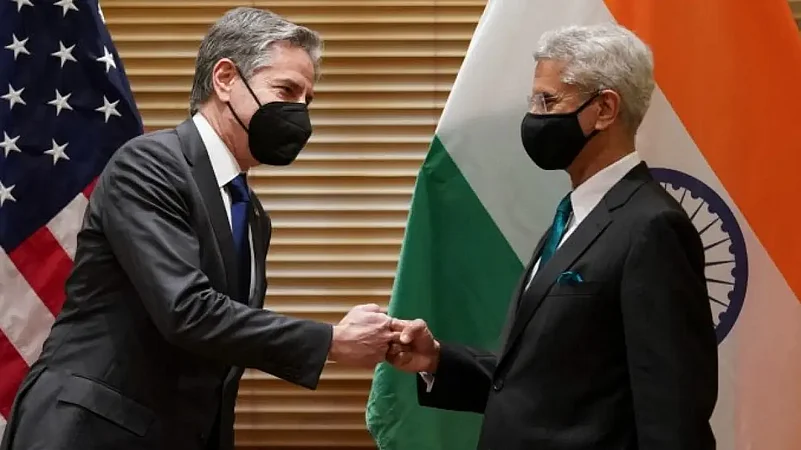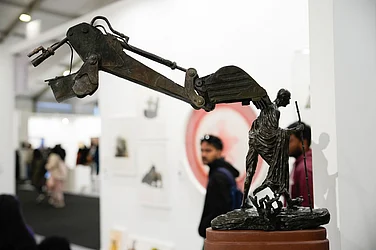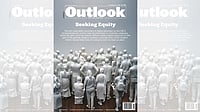External Affairs Minister S Jaishankar in his meeting with the US Secretary of State Antony Blinken on Tuesday raised the issue of the backlog of visa applications from India to which the top American diplomat said he is sensitive to the matter and had a plan to address it.
“It is also in our mutual interest to facilitate the development and mobility of talent. We agreed that impediments over this should be addressed,” Jaishankar told reporters during a joint media availability with Blinken at the Foggy Bottom headquarters of the State Department here following their over an hour-long meeting.
Indians and US Visa
Indians make up a large proportion of the recipients of H-1B and other work visas granted to skilled foreign workers, many in the tech industry.
The H-1B visa is a non-immigrant visa that allows US companies to employ foreign workers in specialty occupations that require theoretical or technical expertise.
The Indian minister did not specifically mention the H-1B visas issue during the joint presser.
There is a keen interest in India's national education policy and we will explore how that can best serve to expand our partnership, Jaishankar said.
"On mobility, specifically visas, this is particularly crucial given its centrality to education, business, technology, and family reunions,” he said.
“There have been some challenges of late, and I flagged it to Secretary Blinken and his team, and I have every confidence that they will look at some of these problems seriously and positively,” Jaishankar said.
Pandemic and the delay in US Visa services- How did Antony Blinken respond?
“Bear with us. This will play out over the next few months, but we're very focused on it,” Blinken said in response to a question when asked about the historic delays in visa appointments that now runs into 800 days.
“On the question of visas, I'm extremely sensitive to this," Blinken said.
US visa services are trying to clear a backlog after Washington the US halted almost all visa processing worldwide in March 2020 due to the pandemic.
Blinken blamed the Covid-19 pandemic for a backlog of visa applications from Indian nationals.
"If it's any consolation, I can tell you that this is a challenge that we're facing around the world and it's a product largely of the Covid-19 pandemic. Our ability to issue visas dropped dramatically during Covid-19,” he said as he explained the self-financing part of the issuing of visas.
“When Covid-19 hit, the demand for visas fell through the floor, visa fees went away, the system, as a whole, suffered. And then of course, in actually issuing visas, even with much more limited resources, we had constraints from Covid-19 about the number of people we could have in our embassies at any one time, etc,” he said.
Blinken said he had a plan to deal with it.
“We are now building back very determinedly from that surging resource. We have a plan, when it comes to India, to address the backlog of visas that has built up. I think you'll see that play out in the coming months," he said.
"But it's something that we're very focused on. These connections, these people-to-people ties, whether it's students, whether it's business people, whether it's tourists, whether it's family, this is what really links us together,” Blinken said.
“The last thing we want to do is make that any more difficult in the country we want to facilitate it," said the US Secretary of State.
Jaishankar is 'bullish' about India-US relations
Having played a key role in shaping the India-US ties over the past few decades, External Affairs Minister S Jaishankar on Tuesday said he is very bullish about this bilateral relationship.
"So very frankly, that's a long way of saying that I'm very bullish about that relationship," Jaishankar told reporters at a joint news conference with US Secretary of State Antony Blinken as he responded to a question on his overall sense of the trajectory of the relationship.
"The big change that I have seen in my four decades as a diplomat was actually in the transformation of India-US relations," he said.
"And your question – how do I see the trajectory – quite honestly, I see today a United States very international, very much more to engaging – very much more open to engaging a country like India, which is actually thinking beyond traditional alliances, which has been very effective at finding common ground with potential or actual partners," Jaishankar said.
And a very good example of all this is actually in the Quad – the informal grouping of Australia, Japan, India and the United States.
"I mean, the fact was a Quad was something we tried about two decades – 15 years – ago. It didn't work, and it is working very well today and it's grown remarkably in the course of the last two years," he noted.
"So I think for us today the relationship with the US opens up a whole range of possibilities, possibilities not just with the United States, though those are important in themselves because I think at this point of time, there's so much that India – and I assume the US too – stands to benefit from working with the United States for – whether it's economy, whether it's technology, whether security," Jaishankar said.
"I would say it's been a very positive experience, a very encouraging one with a lot of promise, of working with the US to shape the direction of the world. I mean, to me that's really the big jump which we have made, and I think the more we work together, the more we engage each other, I think many more possibilities will come," said the minister.
Echoing Jaishankar, Blinken said no two countries have a greater ability and opportunity and responsibility to try to shape the future of this century than the United States and India as the world's two largest democracies.
"What is very gratifying to me is the fact that in all of these meetings, in all of these conversations in this ongoing dialogue we have, we are thinking together and working together in ways that we haven't before," he said.
"That doesn't mean that we don't have differences. We do, and we will. But it also means that because of the depth and quality of the dialogue we have, we talk about everything and work closely together on how we can advance the agenda that we have in common, which – as you've heard, I think, from both of us – extends to virtually every issue that is confronting our own citizens and people around the world," the Secretary of State said.
Blinken appreciated the role of the Indian-American community, which he said does so much to deepen ties between the two countries, as well as to shape the fabric of this country.
(With PTI Inputs)


























